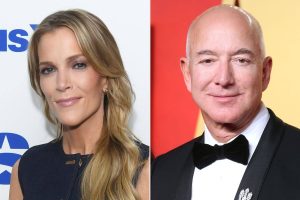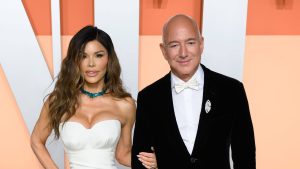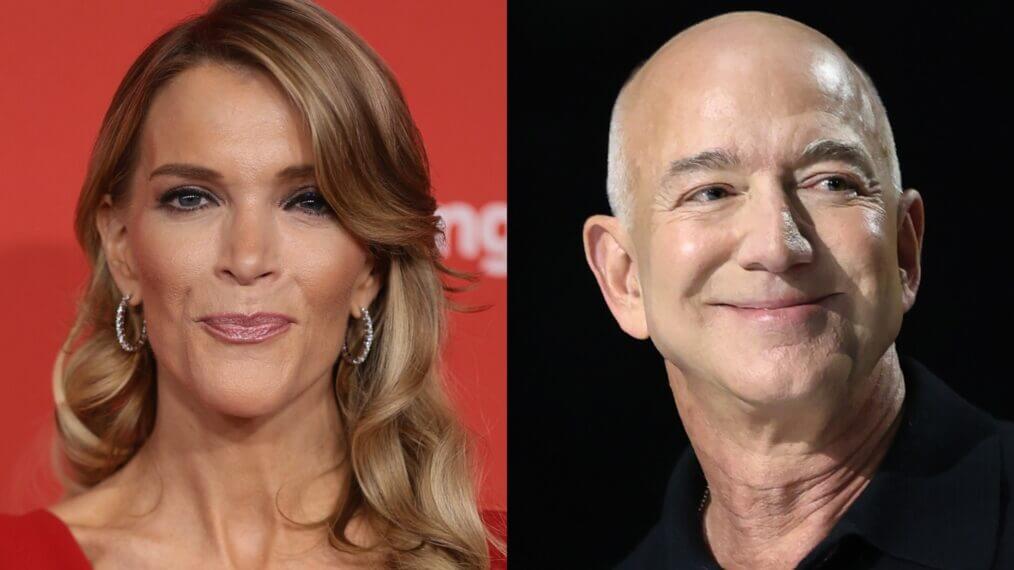world news
Megyn Kelly’s Explosive Critique of Jeff Bezos’ Lavish Wedding: A Celebrity Culture Reckoning
A Wedding Fit for Royalty—and Controversy
When Amazon founder Jeff Bezos and media personality Lauren Sánchez exchanged vows in June 2025 in Venice, Italy, the wedding wasn’t just a ceremony—it was a spectacle. Held on the historic San Giorgio Maggiore island, the $50 million affair drew some of the biggest names in entertainment, media, and business. Oprah Winfrey, Leonardo DiCaprio, Kim Kardashian, and Katy Perry were among the VIP guests in attendance. The ceremony included lavish events spread over multiple days, themed pre-wedding parties, performances by international music stars, and a luxurious yacht cruise.
While many in the media praised the union for its romantic elegance and Hollywood appeal, not everyone was impressed. Protests erupted across Venice from locals and activists criticizing the environmental impact and the commodification of their city. Some labeled it another act of “billionaire exceptionalism,” arguing that such displays of wealth disregard the realities of economic inequality and climate crisis.
But it wasn’t just environmental activists or frustrated locals who voiced criticism. Megyn Kelly, former Fox News host and current SiriusXM personality, delivered one of the most scathing—and headline-grabbing—takes on the Bezos wedding. During her broadcast, she took aim at the aesthetics, the guest list, and most memorably, Bezos himself. With one unsparing comment, she reframed the entire conversation surrounding the wedding.

“A Walking Penis”: The Remark That Broke the Internet
In a moment now etched into the annals of viral media, Megyn Kelly said what many others may not have dared: that Jeff Bezos looked like a “walking penis” at his wedding. Quoting journalist Maureen Callahan of the Daily Mail, Kelly agreed with the observation and added her own flourish:
“He does look like a walking penis. I mean, it does give penis vibes. I’m not gonna lie, it’s not a good look for him.”
She went on to speculate that Bezos had undergone cosmetic procedures, suggesting “something else has happened there to make him look like that.” From the sheen of his bald head to his taut, youthful skin, Kelly didn’t hold back. Her remarks were not limited to Bezos—she also scrutinized Sánchez’s appearance, suggesting she may be “addicted” to plastic surgery.
This scathing commentary instantly went viral, lighting up social media and triggering a wave of memes, hot takes, and heated debates. Some praised Kelly’s brutal honesty, applauding her for puncturing the glamour of billionaire culture. Others criticized her remarks as mean-spirited, body-shaming, and inappropriate, especially given the personal nature of a wedding.
Regardless of where one stood, the impact was undeniable. Kelly’s words broke through the usual celebrity news cycle and sparked deeper conversations about image, authenticity, and the spectacle of wealth in a time of growing social unrest.
Beyond the Insult: Dissecting the Meaning Behind the Mockery
While the “walking penis” line drew the most attention, Megyn Kelly’s comments were rooted in a broader critique of modern celebrity culture. According to Kelly, the guest list—featuring the elite of the elite—was more about optics than genuine relationships. “They care that it’s a star-studded event, not that they have dear friends standing up for them,” she said, emphasizing her belief that the wedding prioritized status over sincerity.
Her analysis questioned the performative nature of wealth and fame, especially when paired with cosmetic perfection and orchestrated media coverage. Sánchez’s appearance, according to Kelly, served as an example of the pressure women in public life face to conform to often unattainable beauty standards. Kelly likened the visible changes in Sánchez’s face to “a warning” and “a little sad,” pointing to what she saw as the corrosive effects of celebrity obsession with youth.
Though wrapped in provocative language, Kelly’s commentary struck at enduring societal issues—namely, the culture of appearances, the influence of wealth on public perception, and the blurred lines between authenticity and performance. In a media environment often saturated with flattery and surface-level praise, her unfiltered words forced audiences to consider uncomfortable truths about what we reward and what we ignore.

The Reaction: Applause, Outrage, and Cultural Reflection
Unsurprisingly, Megyn Kelly’s remarks were polarizing. Supporters praised her willingness to speak bluntly about the excesses of celebrity and the unrealistic expectations surrounding beauty and aging. “Finally, someone said what we were all thinking,” read one tweet that racked up over 100,000 likes. Some fans argued that her critique provided a necessary counterweight to the mainstream media’s fawning coverage of the Bezos-Sánchez nuptials.
But not all responses were positive. Critics accused Kelly of cruelty, arguing that she crossed the line from commentary into personal attack. They pointed out that scrutinizing people’s appearances, especially during intimate life moments like weddings, perpetuates toxic cultural norms around body shaming and public judgment. Others questioned whether Kelly’s own track record as a media personality—often capitalizing on provocative headlines—undermined her authority to critique others’ performances.
Media outlets picked up the story with gusto. From EW and The Wrap to People and Page Six, headlines dissected every part of her tirade. Commentators on talk shows debated the merits and risks of calling out the powerful so brazenly. Was Kelly offering valuable critique, or just capitalizing on controversy? The answer, as with much in celebrity discourse, depended on who you asked.
What was clear, though, was this: Kelly’s moment of “candor” didn’t just target Bezos. It unearthed broader anxieties about money, influence, beauty, and how modern society processes fame. In doing so, it transcended gossip—and became cultural commentary.
A Moment That Defined More Than a Wedding
At its core, Megyn Kelly’s viral takedown of Jeff Bezos and Lauren Sánchez’s wedding is about more than a billionaire’s fashion choices or cosmetic enhancements. It represents a clash between old-school glamour and modern skepticism, between curated image and raw authenticity.
In an age of extreme inequality, where billionaires are often seen as out of touch with the everyday struggles of the average person, lavish events like the Bezos-Sánchez wedding inevitably become lightning rods. The opulence—the private island, the designer gowns, the star-studded after-parties—may dazzle some, but they also invite critique. Who gets to celebrate like this? Who pays the social and environmental cost?
Kelly’s harsh words reflected that discontent. Whether fair or not, they echoed a sentiment many feel but rarely voice: that there is something grotesque about billionaires posturing as royalty in a world increasingly strained by economic, ecological, and social crises. In this sense, her comment wasn’t just about Bezos—it was about what he represents.
As the dust settles, one thing is clear: the conversation Megyn Kelly started isn’t going away. It has reignited questions about who we idolize, what we value, and how we balance admiration with accountability. And while her language may have been crude, the questions it raised are anything but.
From greylittlearrows


